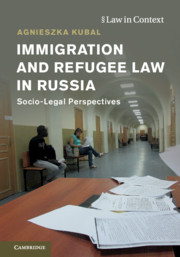Book contents
- Reviews
- Immigration and Refugee Law in Russia
- The Law in Context Series
- Immigration and Refugee Law in Russia
- Copyright page
- Dedication
- Contents
- Figures
- Tables
- Acknowledgements
- Note on Transliteration
- Acronyms
- Table of Laws and Cases
- 1 Socio-Legal Perspectives on Immigration and Refugee Law in Russia
- 2 Immigration and Refugee Law in Russia
- 3 Immigration and Refugee Lawyers as Cause-Lawyers
- 4 Everyday Experiences of Russian Immigration Law
- 5 Tracing the Case File
- 6 The Use of Human Rights in Russian Courts
- 7 Who Are the Humans Behind the Human Rights Cases?
- Conclusions
- Appendices
- References
- Index
4 - Everyday Experiences of Russian Immigration Law
The Entry Bar Case Study1
Published online by Cambridge University Press: 25 March 2019
- Reviews
- Immigration and Refugee Law in Russia
- The Law in Context Series
- Immigration and Refugee Law in Russia
- Copyright page
- Dedication
- Contents
- Figures
- Tables
- Acknowledgements
- Note on Transliteration
- Acronyms
- Table of Laws and Cases
- 1 Socio-Legal Perspectives on Immigration and Refugee Law in Russia
- 2 Immigration and Refugee Law in Russia
- 3 Immigration and Refugee Lawyers as Cause-Lawyers
- 4 Everyday Experiences of Russian Immigration Law
- 5 Tracing the Case File
- 6 The Use of Human Rights in Russian Courts
- 7 Who Are the Humans Behind the Human Rights Cases?
- Conclusions
- Appendices
- References
- Index
Summary
- Type
- Chapter
- Information
- Immigration and Refugee Law in RussiaSocio-Legal Perspectives, pp. 60 - 77Publisher: Cambridge University PressPrint publication year: 2019



